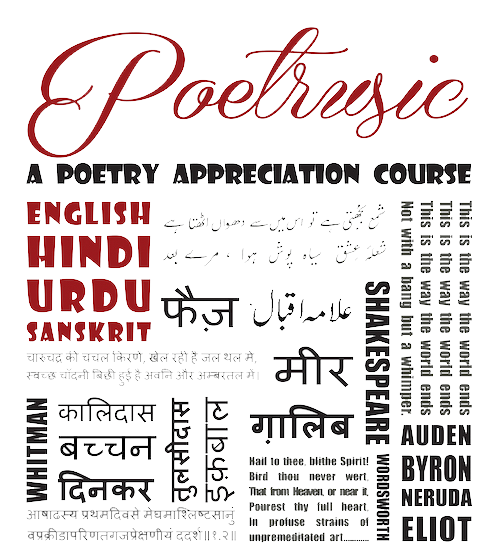-
About Poetrusic:
Poetrusic is a poetry appreciation course that is run in four languages - Urdu, English, Hindi and Sanskrit. It is a sixteen session course that is run over four months; one two-hourly session is held per week on a working day evening such as Tuesday or Thursday. Therefore all languages get about four sessions each.
Prints are brought to class; the instructor recites and explains the pieces of poetry. At times Gazals or songs are played. Knowledge of Sanskrit and Urdu is not mandatory as medium of explanation is either English or Hindi.
In some sessions Punjabi and Gujarati poetry is also brought to discussion. In the preceding modules we discussed Ghalib, Mir, Faiz, Bulleshah, Bachchan, Gupt, Dinkar, Eliot, Auden, Neruda, Shakespeare, Shankaracharya, Jaidev etc. Poetrusic has already had seven modules over the last four years.
Poetrusic is open to individuals in the age group 18 and above.
Pratyancha runs an eponymous channel on Youtube where Poetrusic is offered in one-poem-a-video model; poems in English, Hindi, Urdu and Sanskrit have been discussed across multiple playlists. To get a glimpse into the channel, please access the video links at the bottom of this page.

SAMPLE DISCUSSION AT POETRUSIC:
बाज़ीचा ए अतफ़ाल है दुनिया मेरे आगे
- मिर्ज़ा ग़ालिब
बाज़ीचा ए अतफ़ाल है दुनिया मेरे आगे
होता है शब ओ रोज़ तमाशा मेरे आगे
इक खेल है औरंग ए सुलेमाँ मेरे नज़दीक
इक बात है एजाज़ ए मसीहा मेरे आगे
होता है निहाँ गर्द में सेहरा मेरे होते
घिसता है जबीं ख़ाक पे दरिया मेरे आगे
फिर देखिये अंदाज़-ए-गुल- अफ़्शानी-ए-गुफ़्तार
रख दे कोई पैमाना-ओ-सहबां मेरे आगे
गो हाथ को जुम्बिश नहीं आँखों में तो दम है
रहने दो अभी सागर ओ मीना मेरे आगे
“The world (duniya) is akin to a playground (bazeecha) of children (atfaal) for me and the play, the drama (tamasha) is enacted night and day with I standing witness to it”. Another couplet continues the theme as he in his characteristic style dismisses the absoluteness of any authority be it of the rulers or the messiahs and also the need to marvel at them or hold them in any regard.
“The throne (aurang) of king Solomon (suleman) is a plaything for me and the miracles enacted by the messiahs are but a commonplace thing in the world. Even the mighty sun (sehra) bites the dust (gard) in my presence and the oceans rub their foreheads (jabeen) on the earth constantly upon my watch”.
Standing true to the nature of the ghazal where each couplet is on a different theme though in the same rhyme and meter scheme the poet goes on to speak of a subject very close to his heart: the drinking of wine. “Then you shall behold my demeanour (andaaz) of talking (guftaar) as if a shower (afshaani) of flowers (gul) is emanating from my mouth were you to place a goblet (paimana) of wine (sahbaan) in front of me”.
Continuing the subject of his love for wine and bringing in another recurring theme of his: that of waning strength owing to old age and lack of patrons, he says “though my hand cannot make the requisite motion (jumbish) of picking up the goblet yet my eyes still have the prowess; so let the glass and the serving jug (meena, also called surahi) be, in my view”.
